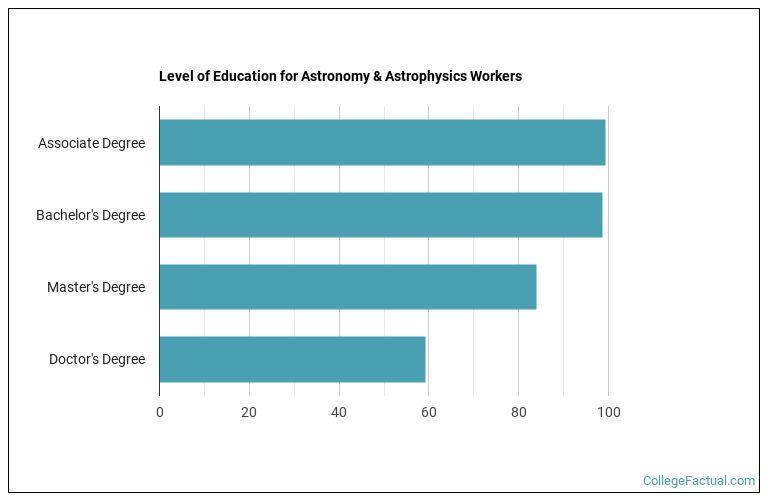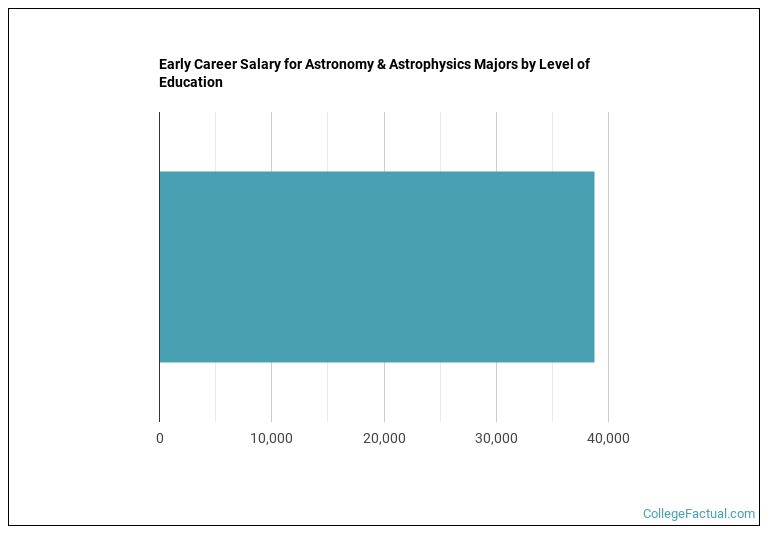 by our College Data Analytics Team
by our College Data Analytics TeamStudents fascinated with space and good with math may excel when majoring in Astronomy and Astrophysics. A degree in this field of study will allow you to learn everything about outer space from galaxies and stars to black holes and planets. You will take classes in calculus, computer science, astrophysics, cosmology, physics, planetary geology, astronomy, and more to gain an understanding of the area beyond our planet.
Possible concentrations within this major include, Astronomy, Astrophysics or Planetary Astronomy and Science.
In 2021-2022, astronomy & astrophysics was the 219th most popular major nationwide with 1,396 degrees awarded. This year's Best Astronomy & Astrophysics Schools ranking compares 25 of them to identify the best overall programs in the country. Explore this or one of our many other custom astronomy rankings further below.
Students interested in pursuing and Astronomy or Astrophysics degree should have a strong background in mathematics. Professionals are often required to complete and explain complex calculations. Critical thinking and analytical skills will allow students to understand these calculations and apply them to the project they are working on. Since professionals often work with others, strong communication and teamwork skills are necessary.
Professionals in the Astronomy and Astrophysics field work full time in offices or observatories. Students should be prepared to work long hours, especially at night, in order to observe stars and other celestial bodies.
Although a master's degree will allow graduates to work in this field, most employers require a Ph.D. These programs typically take 5-7 years to complete and allow students to work in a variety of locations completing fieldwork or research. Internships or summer programs will allow students to gain experience in this field as they work towards an advanced degree.
astronomy & astrophysics degree applicants generally need have finished high school or their GED. Many schools may also have GPA and SAT/ACT score minimums that must be met. In addition to these basic astronomy & astrophysics program qualifications, to serve in some astronomy careers, special certification may be required outside of your degree.
There are various different levels of astronomy degrees. You can spend many years getting as high as a in astronomy & astrophysics to something that takes less time like a . How long it takes to complete some common astronomy degree levels is shown below.
| Degree | Credit Requirements | Typical Program Length |
|---|---|---|
| Associate Degree | 60-70 credits | 2 years |
| Bachelor’s Degree | 120 credits | 4 years |
| Master’s Degree | 50-70 credits | 1-3 years |
| Doctorate | Program required coursework including thesis or dissertation | At least 4 years |
A doctor's degree is the most common level of education achieved by those in careers related to astronomy, with approximately 32.4% of workers getting one. People currently working in careers related to astronomy tend obtained the following education levels.
| Level of Education | Percentage of Workers |
|---|---|
| Doctoral Degree | 35.1% |
| Post-Doctoral Training | 26.8% |
| Master’s Degree | 25.2% |
| Bachelor’s Degree | 9.1% |
| Post-Baccalaureate Certificate | 2.6% |
59.2% of astronomy workers have at least a doctorate. The chart below shows what degree level those who work in astronomy & astrophysics have obtained.

The education level required is different depending on the astronomy career you are seeking.
Graduates with advanced degrees in Astronomy and Astrophysics often go into research and development. While graduates may pursue careers at private companies, the top government employers for astronomers and astrophysicists are NASA and the U.S. Department of Defense. This field is growing at an average pace. Jobs are available, but there is a lot of competition for top paying positions. Graduates with advanced degrees may have to hold multiple postdoctoral internships before pursuing a fulltime position.
Want a job when you graduate with your astronomy degree? Astronomy & Astrophysics careers are expected to grow 10.7% between 2016 and 2026.
The following options are some of the most in-demand careers related to astronomy & astrophysics.
| Occupation Name | Projected Jobs | Expected Growth |
|---|---|---|
| Natural Sciences Managers | 62,300 | 9.9% |
| Physicists | 20,500 | 14.5% |
| Physics Postsecondary Professors | 19,400 | 10.2% |
| Atmospheric, Earth, Marine, and Space Sciences Professors | 14,400 | 9.9% |
| Astronomers | 2,200 | 10.0% |
Astronomy & Astrophysics graduates between <nil> reported earning an average of $38,791 in the <nil> timeframe. Earnings can range from as low as $29,404 to as high as $54,746. As you might expect, salaries for astronomy graduates vary depending on the level of education that was acquired.

Salaries for astronomy & astrophysics graduates can vary widely by the occupation you choose as well. The following table shows the top highest paying careers astronomy grads often go into.
| Occupation Name | Median Average Salary |
|---|---|
| Natural Sciences Managers | $139,680 |
| Physicists | $125,280 |
| Astronomers | $111,090 |
| Physics Postsecondary Professors | $103,830 |
| Atmospheric, Earth, Marine, and Space Sciences Professors | $101,890 |
With over 314 different astronomy degree programs to choose from, finding the best fit for you can be a challenge. Fortunately you have come to the right place. We have analyzed all of these schools to come up with hundreds of unbiased astronomy school rankings to help you with this.
One of 8 majors within the Physical Sciences area of study, Astronomy & Astrophysics has other similar majors worth exploring.
| Major | Annual Graduates |
|---|---|
| Astronomy | 765 |
| Astrophysics | 436 |
| Other Astronomy & Astrophysics | 116 |
| Planetary Astronomy & Science | 79 |
| Related Major | Annual Graduates |
|---|---|
| Chemistry | 20,985 |
| Physics | 13,447 |
| Geological & Earth Sciences | 8,124 |
| General Physical Sciences | 3,141 |
| Atmospheric Sciences & Meteorology | 1,183 |